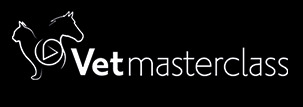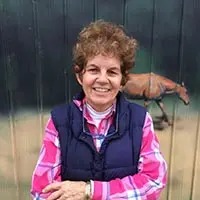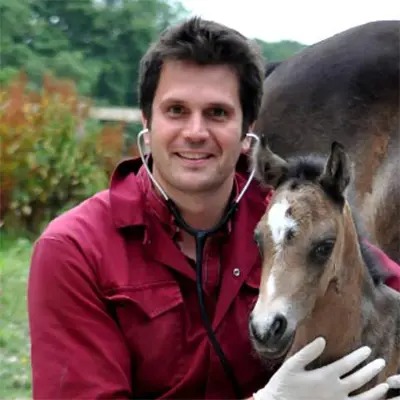Benefits & Pitfalls of Telemedicine in Veterinary Practice
Species
All Species
Contact Hours
3 Hours - RACE Approved
Language
English
Discipline
Other
Practice/Business Management
Veterinary Partner
Equine



Recorded on: 13th April 2021
Panelists:
Elizabeth Herbert BS, MS, DVM – Adelaide Plains Equine Clinic, Australia
Cris Navas LV, PhD, DACVIM – University of Pennsylvania, USA
Simon Staempfli DrMedVet, FVH, DACT, DABVP Equine, Cert IAVC, MRCVS – Sussex Equine Hospital, UK
Moderator:
Jonathan Pycock BVetMed, PhD, DESM, MRCVS – Equine Reproductive Services, UK
CONTENT DESCRIPTION
Telemedicine has many definitions, but is essentially the use of electronic communication and information technologies to provide clinical healthcare remotely. Particularly in the face of the global pandemic or where geographical distances preclude regular vet visits, the ability to deliver effective veterinary care via remote appointments has rightly assumed enormous significance and is tremendously useful. It has also become commonplace for veterinary practitioners to consult with specialist radiologists on their conventional radiographs, MRI or CT images. These are just a couple of the advantages and opportunities telemedicine provides.
However, we need to be wary of “cherry-picking” those aspects of telemedicine that a practitioner likes and disregard the rest. Vets need to recognise and appreciate the clinical, economic, legal, regulatory and ethical aspects (and potential pitfalls) of the new technologies before adopting them.
The international multidisciplinary panel debating the benefits and dangers of telemedicine will consist of an equine internist in academia, a reproduction specialist in private practice and a first opinion equine practitioner from rural Australia. The exchange will be moderated by an equine reproduction specialist who also works for the Veterinary Defence Society (professional indemnity insurance provider). By sharing their experiences this will enable participants to develop telemedicine effectively in their own practice situation. Amongst many others, the panelists will be discussing the following points:
- Could you be held accountable once you have examined an image and have passed a professional opinion?
- Are you confident to prescribe drugs such as antibiotics purely based on an image sent in?
- What steps as a practice do you take to ensure confidentiality, safety and/or security of the exchanged information?
- Do you add WhatsApp messages and information to the computerised clinical record for the horse?
- Should practices that provide telemedicine services pay more for their professional indemnity insurance?
- Some diagnostic imaging telemedicine services provide a reporting service for private practices and universities all over the world. Should they adhere to the licensing rules and regulations of the country/state in which the animal is located?
- In the context of telemedicine, what’s the meaning of an animal being “under your care”?
.
Elizabeth grew up in post-war California. She followed in her father’s footsteps into equine veterinary practice, after completing her BS from UC Davis, a MS and DVM from her beloved Auburn University. She subsequently migrated to Australia, where she practiced veterinary medicine at Adelaide Plains Equine Clinic in Gawler, South Australia, for over 25 years until her retirement in December 2020. She has professional publications on plant toxicity, the treatment of burns in horses, and surgical procedures in horses with colic.
Elizabeth began writing about her experiences as a horse vet and published under Elizabeth Woolsey Herbert's name: Horse Doctor an American Vet’s Life Down Under in 2005 and her father’s letter to his parents during his time in the Army Air Corps. Jacks’ War Letters from an American WWII Navigator in 2015. While veterinary medicine has been her passion, fly fishing, horseback riding, and writing occupy her leisure time. Since her retirement in December 2020, she now writes fictional books about equine veterinarians under the name Elizabeth Woolsey, Horse Doctor Press.
More Info
Equine internist and ultrasound/cardiology expert Dr. Cris Navas joined Penn Vet’s faculty last year, but his history with the School goes further back. From 2008 to 2012, Navas was a cardiology and ultrasound fellow and then lecturer at New Bolton Center. He left for a few years to teach elsewhere in the U.S. and Switzerland before returning to the Kennett Square area in 2019.
Navas’s main interest is exercise-related deaths and cardiac disease in athletes. “It’s an issue that needs to be fixed and has gained public attention recently,” he said. “We’re learning more all the time as new technologies increase our capacity to collect data, but we need better tools and more knowledge to interpret the data.” He is currently testing wireless heart rate monitor wearables that are streamlined for equine wearers, friendly for users, and better able to collect data from a larger population of horses than traditional wired patches. Dr. Cristobal Navas holds a surcingle fixed with a W2ND wireless heart monitor. Dr. Cristobal Navas holds a surcingle fixed with a W2ND wireless heart monitor.
At the same time, he’s also using digital technology, such as handheld ultrasound devices, to create an equine telehealth program. “Remote access and telecommunication tools will allow us to access many more people and advise in real time on cases around the world,” said Navas.
More InfoJonathan is a world-renown expert in equine reproduction based in Yorkshire, England. He is a prolific publisher of papers and book chapters on equine reproduction, and edited the iconinc text, Equine Reproduction and Stud Medicine. He has worked successfully in private practice (developed his own first opinion and referral equine reproduction practice from scratch) as well as teaching and research. Jonathan has been a Member of Council of BEVA for 9 years and currently President Elect. An enthusiastic provider of CPD, he delivers around 65 days of CPD annually, both within the UK and overseas. He has contributed as a speaker or chairman of a session at every BEVE Congress for the last 25 years and is responsible for the BEVA Reproductive Ultrasound Course, which has been a sold-out course annually for the last 20 years.
In 2012, Jonathan became an Equine Claims Consultant for the Veterinary Defence Society in the UK, in which capacity he has acted as an expert witness on many occasions. Jonathan’s main veterinary interests include ultrasonography, breeding the problem mare, and artificial insemination. His well-recognised sense of humour makes him a popular speaker at CPD events world-wide, and a very relaxed and relatable practical instructor.
More InfoSimon grew up on a family farm near Bern in Switzerland. After graduation from the University of Bern in 2003, Simon worked for two years in equine practice in Switzerland before moving to North America, where he completed an Internship in Large Animal Surgery and Medicine at the Ontario Veterinary College (Canada), followed by a Residency in Equine Surgery, Medicine and Reproduction at Louisiana State University (USA). Since graduation Simon has published several times in peer reviewed scientific journals and presented at national and international scientific meetings.
Simon joined the Arundel Equine Hospital in 2010, becoming a partner in 2015. His areas of interest are stud medicine and all aspects of competition horse management. He has developed a particular interest in lameness diagnosis and treatment. Being married to an international dressage rider, Simon appreciates that successful management and rehabilitation of performance horses involves application of conventional and complementary treatment modalities. Hence Simon has further educated himself in equine acupuncture and chiropractic and is integrating these techniques to his treatment protocols.
Simon is a Diplomate with the American College of Theriogenologists (ACT), the American Board of Veterinary Practitioners (ABVP Equine Emphasis), and the International Academy of Veterinary Chiropractic (IAVC).
Outside work, Simon enjoys running and spending family time with his wife and daughter Florence.
More InfoVeterinary Student
Online Panel Discussion
USD 20.00
Qualified Vet
Online Panel Discussion
USD 95.00
Intern/Resident/PhD (Requires proof of status)
Online Panel Discussion
USD 70.00
Vet Nurse/Vet Tech (Requires proof of status)
Online Panel Discussion
USD 70.00
If the options you are looking for are unavailable, please contact us.
No tax will be added unless you are a UK taxpayer
Choose currency at checkout


















